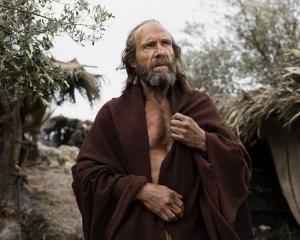
Our children will probably be poorer than us.
That's simply the reality playing out in advanced countries around the globe, says US economic analyst Rana Foroohar. Sitting behind her miserable forecast is the concentration of wealth, during the past several decades, in the hands of the few.
Foroohar makes the comment in Justin Pemberton's new documentary, Capital in the 21st Century, a film based on French economist Thomas Piketty's runaway bestseller of the same name.
Foroohar's prediction, which she says will apply to about two-thirds of the next generation, will alarm many.
It would likely have horrified 18th century novelist Jane Austen. How do we know? That comes back to the rare qualities of Piketty's volume, an economic textbook that somehow sold in the millions and has now inspired a Kiwi documentary maker whose last film was about Richie McCaw, to adapt it for the big screen.
Capital in the Twenty-First Century, the book, stormed the best-sellers lists in 2014 as Piketty rode a wave of concern over rising inequality in the years following the global financial crisis to tell the story of capital, wealth, power and poverty across the centuries.
In doing so, he enlisted the help of literature, mostly prominently Austen and Honore de Balzac, perhaps foreshadowing the suitability of his tale for a filmic treatment.
Money is everywhere in Austen's novels, Piketty wrote, establishing the social status of its characters, who were very clear on what annual income they needed to live lives free from want; and what capital sum would guarantee it.
Such age-old questions never lose their relevance, they remain of interest, including to young audiences, Pemberton says.
Pemberton's film has already screened at the Auckland and Wellington outings of the New Zealand International Film Festival.
"There have been a lot of younger people in Wellington,'' he said on the phone earlier this week. "Yesterday at the matinee, 10.15am on a Monday morning, I didn't think there would be that many people there, but the theatre was packed and there were lots of students.''
They may or may not have been looking for a more condensed telling of the tale than reading Piketty's almost 600 pages involves.

Pemberton doesn't spend much time on the drier minutiae of economics in his film, instead picking up the big sweeping drama of rich and poor across the centuries.
As the director points out, Capital in the Twenty-First Century, the book, opens dramatically with the shooting of South African miners striking for more pay from the English-owned mine for which they worked. How labour and capital should share the cake is an old and fundamental conflict, Piketty wrote.
Pemberton's film opens with another drama-filled moment from history, the fall of the Berlin Wall, the moment when capitalism triumphed.
"The problem was that it went too far,'' Piketty says in early frames of the film.
The fall of the Soviets ushered in a re-energised faith in deregulated markets and the "glorification of private property''.
The triumphalism has been swiftly accompanied by inequality, rising nationalism and xenophobia, just as we saw in the years before World War 1, Piketty says.
"It is a story much darker than the idyllic vision of a march towards progress and light.''
"It's this idea that we are telling in the film, not so much that history repeats, as rhymes,'' Pemberton explains.
There are patterns and the central pattern is that capital is concentrating now in a very similar way to the way it did in 18th and 19th century Europe and America. On both occasions it ended in a bloodbath; respectively the French Revolution and World War 1.

The film proposes that we risk regressing to a world where the middle class is virtually non-existent - almost as poor as the poorest - while extreme wealth condenses into the hands of a privileged few, who, for the most part, don't feel obliged to pay taxes.
As Foroohar says, the big technology companies today fly 35,000 feet above national concerns. They employ few, but make huge profits. And as British commentator Paul Mason adds, governments no longer have access to the income of those involved, as they simply move it offshore.
In 2015, Google Alphabet reported making a $US15.5 billion profit in Bermuda.
"But nothing actually happens in Bermuda,'' Piketty comments in the film.
A dedicated follower of pop culture and the charts, Pemberton first came across Piketty's book when it hit No 1 on the New York Times best-sellers list.
The general terrain was not new to Pemberton, who had previously made a TV documentary on inequality with Nigel Latta on the back of a book by a couple of English academics, The Spirit Level: Why More Equal Societies Almost Always Do Better.
"What was so amazing to me about Thomas' work was that his time horizon was huge - hundreds of years. That creates a different picture,'' Pemberton says.
The documentary cleverly weaves snippets of popular culture into the story - archival footage, film, song, television, Family Guy - but it is built around interviews with some key commentators; alongside Piketty, there is the Financial Times associate editor Foroohar, Nobel prize-winning economist Prof Joseph Stiglitz, political scientist Francis Fukuyama and British journalist and commentator Mason, among others. They were recruited after Piketty made it clear he did not want to be the only person in the film, and in the example of Fukuyama to include people from different points on the political spectrum.
It is a stellar cast, but that's what the book warranted, Pemberton says.
"Because the book had sold three million copies it was expected that it would be a big film. Not a very indie economics kind of documentary.''
What the film's commentators all agree on, from Fukuyama to Mason, is that the concentration of wealth that capitalism tends towards, distorts democracy and can only be addressed by concerted effort.
"Capital can in many ways distort and inhibit democracy,'' Pemberton says. "This is what we are seeing with so many things that most people think are wrong, in terms of things like tax havens and the housing crisis and also the inability to address climate change - it is because of this dominant thing. I wanted to really reveal that, and have people get that and understand that, and also start to think about that and talk about it.
"One of the final words from Thomas is when he says that it is purely a political and intellectual challenge; there is no reason we cannot solve it.''
However, the difficulty of the task was illustrated most recently in this country in the failure of Sir Michael Cullen's Tax Working Group to achieve any progress on a capital gains tax.
Pemberton believes a big part of the reason that effort failed is because people don't understand what capital income is. They remain confused, thinking the capital itself, the property, will be taxed, when all that is being suggested is that the income on it is taxed.
"In America on your tax return, capital income is actually literally called `unearned income' to separate it from this concept of your labour. When we start thinking about capital income in a different way people will have a different discussion.''
As Piketty himself says in the film: "A lot of people are not ready to discuss the merits of strong taxation rates on revenue and inheritance. But without this to regulate capitalism, there will be disastrous consequences for everyone.''
Piketty's solution is for vastly greater financial transparency internationally, and then a global wealth tax to prevent "patrimonial capitalism'' building on itself.

In the book The Piketty Phenomenon: New Zealand Perspectives, published by BWB in the wake of Capital's success, New Zealand-born economist Prof Robert Wade says Piketty's impact has been in part because he says these sorts of things from an economically very conventional standpoint.
He is not lining up with the Marxists and anarchists to bring the system down, but rather suggesting solutions to prevent capitalism from imploding once again.
Civilisation's looming calamity, climate change, is also mixed up with capital, Pemberton says.
"I don't think you can solve climate change without solving the capital crisis, unfortunately. I think that's the only reason we can't solve it,'' he says.
Pemberton did a film in 2006, The Nuclear Comeback, looking at the way in which the nuclear generation industry was repositioning itself as the low-carbon answer to climate change. In the process of making it, Pemberton decided the problem was not what would replace fossil fuels - the renewable answers were there in abundance - the problem was the lobbying of those whose capital was invested in oil.
Australian politics is at the mercy of the fossil fuel lobby, the US similarly, he says.
Or as Piketty puts it: "When you have too strong a concentration of capital it leads to excessive influence over the media and also financing of political campaigns and political parties.''
One person one vote is overrun by one dollar one vote.
"If you look at what's happening, even in the last year, what Donald Trump has allowed in terms of new extraction in America,'' Pemberton says. "It is potentially going to create more emissions than all of Europe. Just from his new permits.''
This despite polls showing most people there, as elsewhere, are concerned about climate change and want to see it addressed.
Money should have no place in politics, Pemberton says.
"Elections need to be free and publicly funded.''
But instead, as Fukuyama says in the film, a layer of oligarchs across the world is buying up political influence.
As they do so, disenfranchised voters are being offered scapegoats to explain the slippage they are experiencing in living standards, immigration among them.
"People are reaching out for the nearest thing they can cling to, and often that is their identity, their ethnicity, their religion,'' Mason adds.
"And they lash out against the nearest enemy they can find.''
It is futile, of course.
"Blaming your neighbour doesn't make you any richer,'' Mason explains.
Pemberton's film is booked to carry the message around the world.
Beyond the local film festival, the documentary is booked to show in all corners of the globe, in China, Italy, Russia, Japan and North America, among other places.
In France, the home of revolution and Piketty both, it will screen on television, in prime time.
Tickets
Capital in the 21st Century screens as part of the New Zealand International Film Festival at The Regent Theatre on Saturday, August 10 at 1pm, and at Rialto on Monday August 12 at 11am.
Director Justin Pemberton will speak following the August 10 screening.













